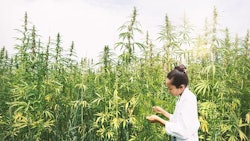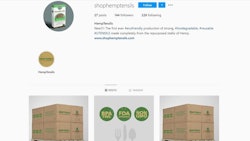
Nearly half a year into the novel coronavirus’s widespread arrival into the U.S., the cannabidiol (CBD) industry is gaining a clearer view of how the pandemic has affected operations.
While regular CBD consumers have increased their consumption, smaller companies have experienced a “significant extinction event” propelled by the coronavirus, according to Brightfield Group’s new report, “Navigating Seismic Shifts: July 2020 CBD Report.”
Though an estimated hundreds of CBD brands have closed, with more likely to come as the year rolls on, Virginia Lee, the CBD Research Manager for Brightfield Group, says the coronavirus has brought out a bright spot in terms of consumer consumption.
“For daily users of CBD, they understand the benefits of CBD, they’ve incorporated it into their daily wellness routine, and [now], they’re using CBD more frequently,” Lee points out.
RELATED: CBD and COVID-19 Part 1: How Sales Are Trending
Consumer Behavior
With the coronavirus has come a mass move to digital on several fronts, from sales to events. According to the Brightfield report, nearly half (45%) of CBD consumers surveyed in June have moved their CBD purchases to online because of the coronavirus. Additionally, online CBD purchasing overall increased by 61% from Q1 to Q2 of 2020.
Consumers’ usage and spending on CBD products has also increased during this time. Of all CBD users surveyed in Q2 of 2020, nearly half indicated they’ve used CBD for more than one year. From Q1 to Q2 of 2020, this number increased by 13%.
The amount of consumers who report using CBD on a daily basis also increased by 6% from Q1 to Q2, according to the report. “As time goes on, consumers become more experienced CBD users,” the report concludes, building a more loyal consumer base.
Lee adds that the coronavirus pandemic appears to have contributed to consumers’ uptick in CBD use. In a consumer survey taken in June, Lee says 39% of CBD consumers indicated they’re using CBD more frequently as a result of COVID-19.
Consumer product preferences have also shifted, as edible products saw a significant leap this year. According to the report, 88% more CBD consumers used CBD gummies and candy in Q2 than Q1. Also in that time period, five times more consumers reported using other edibles, such as baked goods and beverages (from 2% to 10%.)
“I would say gummies have really taken off because they’re such a friendly and easy-to-use format,” Lee says, adding that tinctures, while one of the first CBD formats available to consumers, can be a “foreign concept to many.”
“You’re dealing with a messy bottle, whereas with gummies, they’re tasty and have pre-measured portions,” Lee says.
Business Challenges
Despite CBD consumption on the rise, Brightfield estimates that hundreds of smaller CBD brands have shuttered this year.
Lee says COVID-19 accelerated the process, but an overcrowded marketplace and plummeting hemp biomass prices set the stage for the “significant extinction event” that is likely to continue through the rest of the year.
“I would say that by the end of the year, we’re going to see a lot of CBD companies close,” Lee says.
While online sales are booming, the pandemic has resulted in a steep decline in sales at brick-and-mortar locations.
Additionally, all in-person events that smaller brands relied on to market their products, from local farmers markets to national trade expos, have been canceled or postponed due to the pandemic.
“It’s really hard for companies to get the attention of retailers, as small and large trade shows have gotten canceled,” Lee says. “This is definitely going to make it harder for small brands to compete, as big companies like Charlotte’s Web and Medterra already have long-standing relationships with retailers, so it’s easier for them to add more products to the line and have a store carry it than for totally new companies to introduce themselves to a CVS or Walgreens.”
According to the report, the CBD companies that are most likely to be successful throughout the pandemic have:
A strong e-commerce presence.
A well-recognized brand.
A small digital marketing strategy.
An extensive direct-to-consumer (DTC) presence through blogs, an easy-to-navigate website, newsletters and social media.
“What’s hurting these smaller brands is for companies that didn’t have a strong DTC presence and were undercapitalized to begin with, it’s hard to suddenly shift,” Lee says.
Some brands have also found that rolling out new products has paid off in increasing brand awareness and sales. While many consumer packaged goods companies are focusing on core brands rather than creating new products to “streamline supply chains and reduce complexity in the uncertain environment,” the report says, CBD companies with new products are drawing in new consumers and keeping existing ones interested in the industry.
Major innovations include adding minor cannabinoids, such as cannabigerol (CBG) and cannabinol (CBN) to products, as well as immunity support ingredients, such as elderberry, echinacea and vitamin C, the report says.
Overall, the CBD arena will likely continue to be challenging to navigate throughout the pandemic, especially for smaller brands or those seeking to break into the industry.
”New CBD companies will find it difficult to enter retail channels as in-person sales calls have been paused and major trade shows such as Natural Products Expo West and NoCo Hemp Expo have been canceled,” the report concludes. “Brands prioritizing retail penetration will need to reevaluate as online channels grow stronger.

























